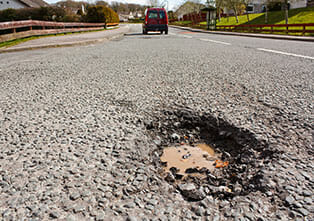Potholes Create Hazards for Tennessee Drivers
May 6th, 2016 by Attorney John Colvin

In March 2015, the Tennessee treasury department reported receiving at least 300 claims since February from drivers whose cars were damaged by potholes. Most of the time, drivers learn they won’t be receiving any compensation for pothole damage, because for a state or local agency to pay a claim, a driver must prove that the agency was aware of the pothole and did not attempt to repair it within a reasonable amount of time.
According to the AAA, pothole damage to vehicles costs U.S. drivers about $3 billion each year. Flat tires and bent rims are common outcomes of hitting a pothole. But potholes can also damage a car’s suspension, exhaust system, and steering alignment – all problems that are costly to repair. Even worse, potholes can cause drivers to lose control of their car and crash.
A Deadly Crash
About a week before Nashville Public Radio reported the numerous pothole-related claims in 2015, a deadly crash occurred on Nashville’s Briley Parkway. A man hit a pothole and lost control of his motorcycle, sideswiping a car before he hit a guardrail. He died at the scene.
Almost a year later, in February 2016, Briley Parkway was riddled with potholes after heavy snow and rain. Even though workers moved quickly to fill the holes, one pothole caused a crash resulting in a traffic jam miles long.
One reason potholes return year after year is that patching them with asphalt isn’t a permanent fix. Some roads will continue to deteriorate after harsh weather, unless they’re repaved, and repaving costs money that some state and local governments don’t have. Until government is able to fund much-needed infrastructure improvements, drivers will need to do what they can to avoid potholes.
Pothole Awareness
Automotive Fleet magazine has some tips for drivers on how to avoid pothole damage:
- Check tires regularly to ensure they’re properly inflated. Use a tire gauge to measure pressure when the car has been idle, so the tires are cool. Proper inflation guidelines are located in a car’s owner’s manual and often on the edge of the driver’s side door.
- After snow has thawed, or after periods of heavy rain, be on the lookout for potholes. Often, puddles in the roadway are holes filled with water.
- If a pothole is unavoidable, hold the steering wheel tightly, apply the brakes, and let off the brakes before hitting the hole, so the car’s suspension is fully engaged to absorb the impact. When possible, try to align your wheel with the center of the pothole, rather than hitting the edge of the hole.
- Follow other cars at a safe distance, so you can spot potholes ahead of you.
- If you do hit a pothole, and the impact is jarring, be alert to any signs of damage, such as the steering pulling to the side or rattling and scraping sounds coming from beneath the car. Check for tire damage when it’s safe to do so. Potholes may damage tires to the extent that they rupture or lose air immediately, but a slow leak is harder to detect. When a tire is slowly going flat, a driver may not be aware until the car becomes harder to steer or turn.
Drivers can help make roadways safer by reporting large potholes in highways and state roads to the Tennessee Department of Transportation and reporting local roadway potholes to city or county government.
John R. Colvin, Attorney at Law, has successfully represented injured clients throughout Tennessee and Alabama who have been seriously hurt due to pothole-related accidents. For 20 years, he has been helping victims put their lives back on track, and he is ready to help you. For advice on how to proceed next or if you have any questions about this topic, call (931) 962-1044 or submit this online form. Put his bold approach and client focus to work for you.
Disclaimer*
The information on this website is for general information purposes only. Nothing on this site should be taken as legal advise for any individual case or situation. This information is not intended to create, and receipt or viewing does not constitute, an attorney-client relationship. No representation is made that the quality of the legal services to be performed is greater than the quality of legal services performed by other lawyers.

